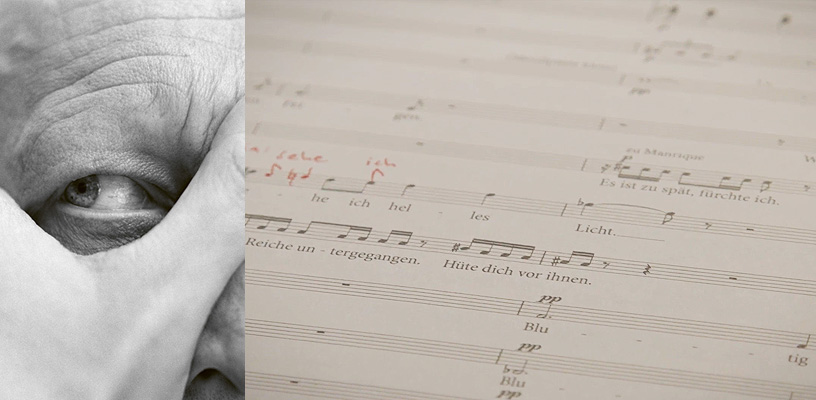Detlev Glanert: The Jewish woman of Toledo takes the stage

Detlev Glanert's new opera has its world premiere at the Semperoper in Dresden on 10 February. The Jewish woman of Toledo is based on the historical drama by Franz Grillparzer and revolves around the themes of love, betrayal, abuse of power and conflict.
The Semperoper in Dresden unveils Detlev Glanert’s new opera, Die Jüdin von Toledo (The Jewish woman of Toledo), with a libretto by Hans-Ulrich Treichel based on the classic play by Franz Grillparzer. The seven performances by the Saxon State Opera, opening on 10 February and running into March, are under the musical direction of Jonathan Darlington. The opera is staged by Robert Carsen who was also responsible for directing the highly successful premiere of Glanert's previous opera Oceane at the Deutsche Oper in Berlin in 2019 - that collaboration between Glanert, Treichel and Carsen was honoured with the Oper! Award, the International Opera Award and the Opus Klassik.
The new opera tells how King Alfonso VIII of Castile falls in love with the young Rahel, a woman of simple Jewish origin. It is a passionate union but seems infelicitous, both privately and politically, and distracts the lover from his duties as ruler. It is thwarted from many sides - by Alfonso's wife, by his councillors, by religious opponents - and ultimately ends in the murder of Rahel.
This medieval story has been adapted many times over the centuries, most prominently by Lope de Vega, Franz Grillparzer and Lion Feuchtwanger. For their new stagework, Glanert and his librettist Hans-Ulrich Treichel mainly draw on Grillparzer's tragedy, sharpening the political and psychological aspects. The composer relates how he was "particularly interested in how politics and its mechanics intervene in private life in a bestial way ... Xenophobia is used to achieve certain political goals - by working with agitation, fake news and every weapon society has its disposal. This has happened repeatedly in all eras ... I am interested in dealing with an exciting story which can be seen to have many parallels all over the world today."
Glanert's dramatic and emotional score incorporates the diverse historical and cultural background of history from times when Christians, Moors and Jews on the Iberian Peninsula were already looking back on centuries of complex co-operation and opposition. For example, the composer uses bell sounds to depict the Christianised city or, as in his very first opera Leyla and Medjnun, the Arabic Ud at key points to depict the Moorish traditions.
Glanert aimed for a distinctive ‘tinta musicale’, as Verdi would have described it, for The Jewish woman of Toledo. Whereas the soundworld of his preceding opera Oceane was coloured with the siren song of the sea, the new opera seeks a musical equivalent to the heavy oak panelling of the Castilian interiors of Toledo. The composer describes how “the pseudo-tonal element is pushed back, the harmony harsher and the orchestra more vicious”. Verdi inevitably becomes a reference point for a story that triggers cultural memories of the austerity and gloom of the Inquisition and court ceremonies, albeit harking from four centuries after the opera’s era.
The opera is cast in the five acts familiar from nineteenth century Grand Opera, and the dramatic structure also incorporates four interludes which give ample scope for Glanert’s orchestral imagination. He describes how "as elaborate music, the interludes record the past and anticipate the future as if in a curvature of time". Motives and scoring also help to paint the characters and provide dramatic contrast. For instance, the three female characters are distinctively delineated: Rahel with the flute, her sister Esther by the cor Anglais, and Queen Eleanor with a creeping pianissimo motive cut off by a dissonance.
This spring is rich in premieres for Detlev Glanert, in addition to The Jewish woman of Toledo. A new Cello Concerto for Johannes Moser was premiered on 19 January with the Luxembourg Philharmonic under Gustavo Gimeno, followed by its first German performance at the Philharmonie in Cologne. Moser travels with the concerto to Canada for its North American premiere on 27 March in Toronto conducted by Osmo Vänskä. Glanert’s new percussion concerto for Christoph Sietzen highlights tuned keyboard instruments including vibraphone, marimbaphone and glockenspiel. The world premiere with the Arctic Philharmonic in Bodø, Norway on 24 May will be followed by performances in Barcelona and Frankfurt in future seasons, all with Sietzen as soloist.
Detlev Glanert
Die Jüdin von Toledo (2020-22)
(The Jewish woman of Toledo)
Opera in five acts, freely adapted
from the play by Franz Grillparzer
Libretto by Hans-Ulrich Treichel
World premiere: 10 February 2024, Semperoper Dresden
Further performances: 15/18/26 February, 1/8 March 2024
Preview: 5 February 2024
Director: Robert Carsen
Conductor: Jonathan Darlington
Design: Robert Carsen, Luis F. Carvalho
Rahel: Heidi Stober
Esther, her sister: Lilly Jørstad
Alfonso VIII, king of Castile: Christoph Pohl
Eleanor of England, his wife: Tanja Ariane Baumgartner
Manrique, Count of Lara: Markus Marquardt
Don Garceran, his son: Aaron Pegram
> View video introductions on the Semperoper website
> Further information on Work: Die Jüdin von Toledo
Motif by Marton Perlaki for Saxon State Opera: Score of the opera by Detlev Glanert
